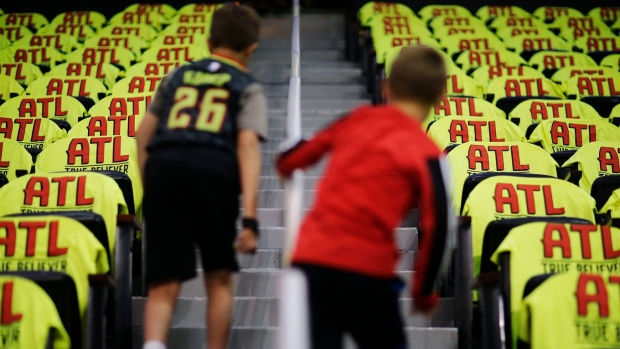Nov 1, 2016
Hawks planning $192.5 million arena renovation
The Atlanta Hawks have announced a $192.5 million renovation of Philips Arena, with the city providing the bulk of the funding.
The Canadian Press

ATLANTA — The Atlanta Hawks are planning a $192.5 million renovation of Philips Arena, with the city providing the bulk of the funding.
As part of the deal announced Tuesday, the Hawks agreed to an 18-year lease extension to remain at the city-owned arena through 2046.
The city will contribute $142.5 million toward the project, which will most noticeably alter the look of the luxury boxes stacked on one side of the arena. There will be new amenities, a variety of different-size suites, improved sightlines for basketball, a state-of-the-art video system, and connected concourses throughout the 17-year-old facility.
Philips Arena originally was built to host both the NBA's Hawks and the NHL's Atlanta Thrashers. The hockey team moved to Winnipeg in 2011.
Mayor Kasim Reed had pledged to contribute to an arena renovation when the Hawks were in the process of being sold by former controlling owner Bruce Levenson, who gave up the team after revealing that he sent a racially insensitive email. Tony Ressler wound up leading a group that purchased the Hawks and operating rights to the arena.
Ressler said all along that he preferred to remain downtown rather than pursue a new facility, as long as Philips Arena was upgraded.
"We knew that a key part of producing a winning team, providing a superior fan experience and being a civic asset to the city of Atlanta required a renovation of our arena and a meaningful improvement to the downtown area of this city," Ressler said. "Today's announcement with the mayor is a significant step toward this goal, and we look forward to this exciting transformation that will ensure that we provide the best fan experience possible now and for the next 30 years."
Reed said the renovation was part of a long-range plan to transform an unsightly tract of downtown adjacent to the arena and the new $1.4 billion Mercedes-Benz Stadium, a retractable-roof facility set to open next year as home to the NFL Falcons and a Major League Soccer expansion team, Atlanta United.
There have been talks about turning the area, known as "the gulch," into a mixed-used development much like the highly successful LA Live complex next to Staples Center in Los Angeles. Reed said it's part of a plan to connect the sports venues to popular tourist attractions around Centennial Olympic Park, as well as to one of the city's biggest development flops, Underground Atlanta.
"This is the first stake in the ground in transforming the critical corridor," Reed said. "I want to thank Tony Ressler and the Atlanta Hawks' ownership for committing to this deal that will keep the NBA in our city and help re-imagine downtown for the millions of residents, visitors and tourists who come to Atlanta each year."
It's another huge commitment by the city to a sports venue, though Reed stressed that no money from the city's general fund will be used and no new taxes will be needed.
About $110 million will come from extension of car-rental tax and the city will contribute $12.5 million from the sale of Turner Field to Georgia State University and a development company, a deal expected to close by the end of the year. The remaining $20 million from the city will come from a series of expected future land sales, the mayor added during a City Hall announcement.
The renovation of Philips Arena comes on the heels of the city agreeing to spend at least $200 million — and perhaps much more, some critics have argued — for the Falcons' new stadium, which will replace the 24-year-old Georgia Dome. In addition, suburban Cobb County put up some $400 million on public funding to build a new baseball stadium for the Atlanta Braves that opens next season.
SunTrust Park, about 12 miles from downtown, will replace Turner Field even though that stadium is only two decades old. Georgia State plans to downsize the Braves' former home into a 30,000-seat stadium for its football program.
The renovations on Philips Arena will begin next summer and should be completed by the start of the 2018-19 season. The Hawks will continue to play at the arena during the overhaul, with much of the work being done over the next two offseasons.

